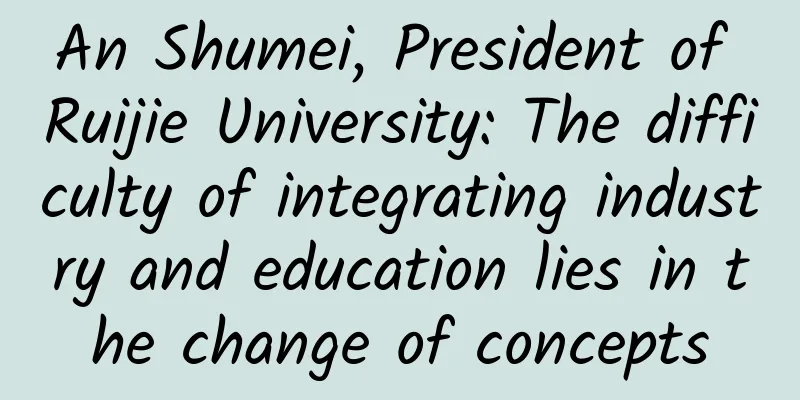An Shumei, President of Ruijie University: The difficulty of integrating industry and education lies in the change of concepts

|
[Original article from 51CTO.com] "Industry-education integration means sending engineers to schools to give lectures. To some extent, this exaggerates the capabilities of enterprises. The essence of solving the problem of industry-education integration does not lie in turning industry engineers into teachers, but in the extent to which teachers can impart industry knowledge and professional experience." An Shumei, president of Ruijie University, said in an interview with 51CTO reporters. Because knowledge is easy to acquire, but ability is hard to replicate. Being a teacher requires not only professional knowledge, but also an understanding of pedagogy and psychology, and the courage to give lectures, which are difficult for corporate engineers to replicate. It is easier for teachers to learn engineering projects, practical knowledge, and professional skills. "The difficulty of integrating industry and education lies in the change of concepts. Introducing industrial engineers into teaching classrooms can solve the problem of talent shortage in the short term, but it cannot solve the fundamental problem in the long run. Only by changing this concept can the integration of industry and education succeed." An Shumei said.
An Shumei, President of Ruijie University Therefore, the industry-education integration and school-enterprise cooperation launched by Ruijie Networks are more about allowing college teachers to participate in the work of engineers and conveniently obtain the work standards and core technologies of engineers. At the same time, it helps the Ruijie industry ecosystem with employment needs and the education ecosystem with talent training capabilities to achieve seamless connection. Promote the integration of industry and education to solve the imbalance between supply and demand of IT talents "A successful training model should be one in which the abilities that students possess upon graduation can meet the employment needs of companies," An Shumei believes. However, the reality is not like this. Take the current situation of talent demand in computer network technology application as an example. Due to the large investment in network professional teaching, the computer professional teaching hours of ordinary colleges and universities are limited, unable to keep pace with the industry needs and update, and unable to meet the employment requirements of enterprises. The number of computer network graduates sent to society by colleges and universities across the country each year is far from meeting social needs, and there is a serious imbalance between talent supply and demand. At the same time, because companies have high requirements for talent capabilities, it has caused a social phenomenon in which companies are eager to recruit talents and graduates have difficulty finding jobs. As the largest technical support department of Ruijie Networks, Lin Xiaohai, general manager of Ruijie Networks Technical Service Department, also said that Ruijie Networks and its partners are both confused about talent. On the one hand, the talent gap is very large, and there are still a large number of vacancies in Ruijie Networks' technical service system. On the other hand, the entire human resource structure of partners is in urgent need of talent due to frequent personnel changes and long job training cycles. "Therefore, we have always hoped to do something for talent training, to empower engineers and to develop Ruijie's industrial ecosystem." To solve the problem of talent supply and demand and realize the goal that students can use what they have learned after graduation, and use what they have learned, we need the deep integration of industry and education, and the coordinated operation of the "two wheels" of schools and industries, and the "two wheels" drive. Deepening the integration of industry and education and promoting the organic connection between the education chain, talent chain, industrial chain and innovation chain are the urgent requirements for promoting the structural reform of the supply side of human resources. They are of great significance to comprehensively improve the quality of education, expand employment and entrepreneurship, promote economic transformation and upgrading, and cultivate new momentum for economic development under the new situation. Ruijie Networks releases four major industry-education integration plans In 2004, Ruijie Networks established a specialized education and research institution, Ruijie University, and has been deeply involved in various national education reform projects. To date, Ruijie University has trained more than 80,000 network engineers who have obtained Ruijie professional certification and provided laboratory solutions for more than 3,000 colleges and universities. Recently, Ruijie Networks upgraded and released four major industry-education integration plans: service talent delivery plan, seed teacher training plan, applied technology collaborative innovation plan, and competition inclusive plan. Service Talent Delivery Plan: Through Ruijie Network Academy and Ruijie Industry Alliance Talent Training Base, we deeply connect with Ruijie Network’s partners in talent output and empowerment, providing a seamless “welding point” for the deep integration of talent training and industrial ecology. "Based on Ruijie Network Academy, through in-depth course docking, we will build a talent pool for Ruijie's upstream and downstream ecological partners and even the entire industry." An Shumei said: "In the industry alliance talent training base, we not only let students get certification, but also hope to achieve a closed loop of talent training. Ruijie Industry Alliance Talent Training Base mainly achieves three things: first, empowering people, providing certified talents for partners; second, empowering, providing on-the-job training for partners; third, building an ecosystem, building a talent training ecosystem." Seed Teacher Training Program: Students' grades are inseparable from the training of teachers. In order to promote educational development and improve teachers' professional capabilities, Ruijie Networks has launched a school-enterprise cooperation project for seed teacher training bases. Through the seed teacher training base, professional teachers in vocational colleges are empowered. The training base mainly focuses on: WLAN, cloud computing, big data, SDN, and network technology. Ruijie Networks plans to select at least one qualified university in each province/autonomous region to build a seed teacher training base. Based on this, it will train young teachers in computer majors in vocational colleges to improve their technology, projects, and teaching and research capabilities. Collaborative Innovation Plan for Applied Technology: With information majors as the theme, and with the focus on cultivating emerging technologies and transforming traditional majors, a collaborative innovation center for innovation incubation and achievement transfer will be built through in-depth cooperation between colleges and universities and Ruijie Networks. The collaborative innovation center is mainly oriented towards the two fields of future network technology and big data technology. With a 1:1 investment in school-enterprise co-construction, Ruijie plans to establish 10 pilot cooperative colleges, five in each of the two fields of big data technology and future network technology. The center has six main functions: product function pre-research, new product testing, teaching resource innovation, competition program innovation, teaching platform innovation, and technical consulting services. Competition inclusive plan: The plan provides three inclusive services: equipment inclusive service, resource inclusive service, and in-competition inclusive service. A "network application skills training base" is established through the school-enterprise co-construction approach. Ultimately, through this plan, the competition will be promoted to benefit more educational groups and more colleges and students. Skills competition is the fastest way to promote the integration of industry and education There is more than one way to promote the integration of industry and education, and skills competitions are one of the fastest ways to benefit vocational education. Over the years, Ruijie Networks has actively supported vocational school skills competitions, introducing real industrial equipment, typical industry scenarios, and real work processes and evaluation standards of industrial engineers into the competitions, enabling participating schools to better understand industry development trends and the industry's talent requirements, thereby achieving the goal of matching the capabilities of industrial engineers with contestants, and matching industrial applications with competition content. The "Ruijie.Qixiang Cup" computer network application competition of the National Vocational School Skills Competition was successfully held in Jilin from June 2 to 4, 2018. As a long-term partner of the competition, Ruijie Networks made every effort to ensure the success of the competition in terms of equipment, technical support, and supporting services. The competition aims to achieve the goal of "using competition to promote learning, using competition to promote reform, and using competition to promote teaching". Through the competition, students' curiosity and enthusiasm for participating in teaching activities will be stimulated, the integration of industry and education will be deepened, and the talent training model of industry-education integration will be promoted. Participating colleges and universities will have a clearer understanding of the development trend of the industry and the industry's demand standards for talents, thereby meeting the urgent needs of the national informatization strategy for a large number of integrated network talents and promoting the reform and development of related majors such as computer network technology. After the competition, Sun Qi, a representative of the instructors of Beijing Information Vocational and Technical College, told reporters: "Our school has always attached great importance to this vocational skills competition. We hope to test the achievements of our teachers and the skills mastery of our students through this vocational skills competition. At the same time, we also take this opportunity to carry out in-depth school-enterprise cooperation. The result of the competition is not the most important. What is important is that we deepen the teaching reform and optimize the curriculum system through this competition." "I am very happy to have the opportunity to participate in this competition. We have gained a lot from this competition. Through pre-match preparation and actual competition, our professional skills have been greatly improved, which will be of great help to our future employment and social practice. We also hope to participate in more such competitions in the future." A representative of the participating team from Jilin Electronic Information Vocational and Technical College said when talking about his gains from the competition. In an interview with ***, An Shumei said: "The purpose of Ruijie University is to impart knowledge and skills, transfer our mature experience to education, and cultivate talents according to the talent standards of the industry rather than the theoretical system through the integration of industry and education." She called for: "We hope that more colleges and universities can explore the path of industry-education integration together with Ruijie. Together, we can make industry-education integration and school-enterprise cooperation take root and sprout, and empower the construction of our entire network and information majors, as well as the IT industry ecosystem!" [51CTO original article, please indicate the original author and source as 51CTO.com when reprinting on partner sites] |
<<: Teach you how to solve the WiFi coverage problem in various apartment types
>>: China Mobile may withdraw all 3G networks by 2020, but terminals still need to support GSM
Recommend
Communications man, what on earth have you done to Everest?
Do you still remember the 5G "cloud supervis...
Slow internet speed, lagging video conferences, these are the pain points of Wi-Fi for small and micro businesses. How to solve them?
Currently, online video conferencing has become a...
Taiyixingchen: Breaking through bottlenecks allows security companies to focus on network security
[51CTO.com original article] Recently, Beijing Ta...
China Mobile announces it has built more than 500,000 5G base stations
On the afternoon of August 31, the 2021 World 5G ...
Today's encryption mechanisms will be defeated by quantum attacks, except for generalized knapsack codes.
[51CTO.com original article] Today's encrypti...
How unified communications technologies can support long-term remote work
[[354214]] Organizations implementing long-term r...
In the future, AI can be used for 5G network analysis
There are many blogs and vendor papers about 5G r...
Huawei's approach to building smart cities under four major constraints
[51CTO.com original article] The rapid developmen...
Yecao Cloud: Hong Kong special cloud server annual payment starts from 138 yuan, independent server monthly payment starts from 399 yuan
Yecaoyun, a Chinese VPS host, has released a new ...
Network Lifecycle Management Guide
The network lifecycle management process helps ne...
DMIT.IO Christmas recharge/renewal rebate, high-defense CN2 GIA line VPS 20% off
DMIT.io has launched a Christmas promotion, inclu...
Hostwinds: VPS monthly payment starts at $4.99, cloud server starts at $0.006931/hour, free IP change
Hostwinds is a long-established foreign merchant ...
How does network monitoring work?
Network monitoring complements network management...
6 ways 5G will change IoT solutions
The implementation of 5G will facilitate the deve...
How Apple's iCloud Private Relay powers enterprise VPNs
Apple's iCloud Private Relay service offers p...









